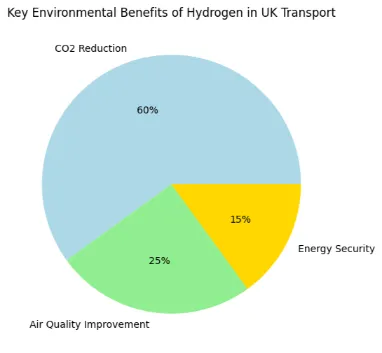
Hydrogen Fuels UK: Economic and Environmental Advantages for Transport
Hydrogen fuels in the UK are quickly becoming essential for the country’s shift to clean, sustainable transport. Supported by significant government funding and innovation in the industry, hydrogen provides remarkable economic and environmental benefits. It is crucial for reducing emissions in the UK’s transport sector and promoting green growth.
Economic Benefits of Hydrogen Fuels UK in Transport
Massive Investment and Job Creation
The UK government has dedicated over £500 million to build hydrogen infrastructure. They plan to increase low-carbon hydrogen production capacity to 10 GW by 2030. This growth is anticipated to draw more than £11 billion in investments and create thousands of skilled jobs in manufacturing, engineering, and supply chains. For instance, the Hydrogen to Power (H2P) initiative alone could support over 5,000 jobs and contribute more than £2 billion in gross value added (GVA) by 2030.
Boosting Regional Economies
Investments, like the £8 million allocated for hydrogen-powered transport projects in the North East, are helping to develop regional hydrogen hubs. These hubs encourage local expertise and supply chains. They support a variety of applications, from vehicles at airports to delivery trucks, boosting economic activity and innovation in places like Teesside.
Reducing Energy Costs and Improving Resilience
Hydrogen helps diversify the energy mix and lowers dependence on imported fossil fuels. This protects the UK economy from unstable global energy prices. The Hydrogen Energy Association estimates that incorporating hydrogen into the national energy system could save between £13 billion and £24 billion from 2030 to 2050. This would provide flexible, low-cost energy storage and generation.
Supporting Export Opportunities
Building a strong hydrogen economy allows the UK to emerge as a global leader in hydrogen technologies. This opens up export markets for hydrogen production, fuel cells, and related innovations, which further boosts economic growth and technological leadership.
Environmental Advantages of Hydrogen Fuels UK in Transport
Significant Carbon Emissions Reduction
Transport is the biggest single source of UK domestic greenhouse gas emissions, making up 27% in 2019. Hydrogen-powered vehicles emit only water vapor, providing a zero-emission alternative to petrol and diesel. By 2050, up to 30% of the European transport fleet may be using hydrogen, leading to a cut of over 30 million tonnes of CO2 each year in the UK alone.
Decarbonising Hard-to-Abate Sectors
Hydrogen fuels are essential for sectors where electrification is tough, including heavy goods vehicles, buses, aviation, maritime, and rail. The government’s strategy supports hydrogen use in these areas, with early projects showing cleaner operations at airports, hydrogen-powered buses, and fuel cell trains.
Learn about innovative hydrogen train projects like HydroFLEX and the future of hydrogen trains in the UK.
Improving Air Quality
In addition to reducing CO2 emissions, hydrogen vehicles eliminate harmful pollutants like nitrogen oxides and particulate matter. This improves air quality in urban areas and benefits public health.
Supporting Renewable Energy Integration
Hydrogen production through electrolysis can utilize excess renewable electricity, allowing for energy storage and grid balancing. This integration enhances the use of clean energy sources and helps the UK achieve its broader net-zero goals.
Government Commitment and Strategic Roadmap
The UK government’s hydrogen strategy focuses on boosting demand through transport applications. It includes clear targets and funding plans to speed up adoption. Initiatives involve:
- Expanding hydrogen refuelling infrastructure to support growing fleets.
- Funding innovative projects focused on hydrogen-powered vehicles and supply chains.
- Developing skills and training for the workforce to meet industry demands.
- Creating business models that encourage hydrogen production and use in transport.
Conclusion
Hydrogen fuels in the UK offer an appealing economic and environmental solution for the future of transport. With strong government support, increasing investment, and advancing technology, hydrogen is poised to lower emissions, create jobs, and promote sustainable economic growth. As the UK boosts hydrogen production and infrastructure, hydrogen-powered transport will be vital in reaching net zero and ensuring a resilient, low-carbon economy.
Hydrogen Energy Case Studies & Resources
Explore these real-world applications and strategic documents about hydrogen technology:
Hydrogen Refuelling Case Studies
Fuel Cell Systems showcases practical implementations of hydrogen refuelling solutions across various industries.
Source: Fuel Cell Systems UKTees Valley Hydrogen Transport Project
A case study on hydrogen-powered transport initiatives in the Tees Valley region of the UK.
Source: CenexHydrogen-Powered HGV Innovation
Case study about an innovative hydrogen-powered heavy goods vehicle developed in Glasgow.
Source: Glasgow City of Science & InnovationUK Hydrogen Strategy
The official UK government publication outlining the national strategy for hydrogen energy development.
Source: UK GovernmentNote: These links are external resources and will take you to third-party websites.